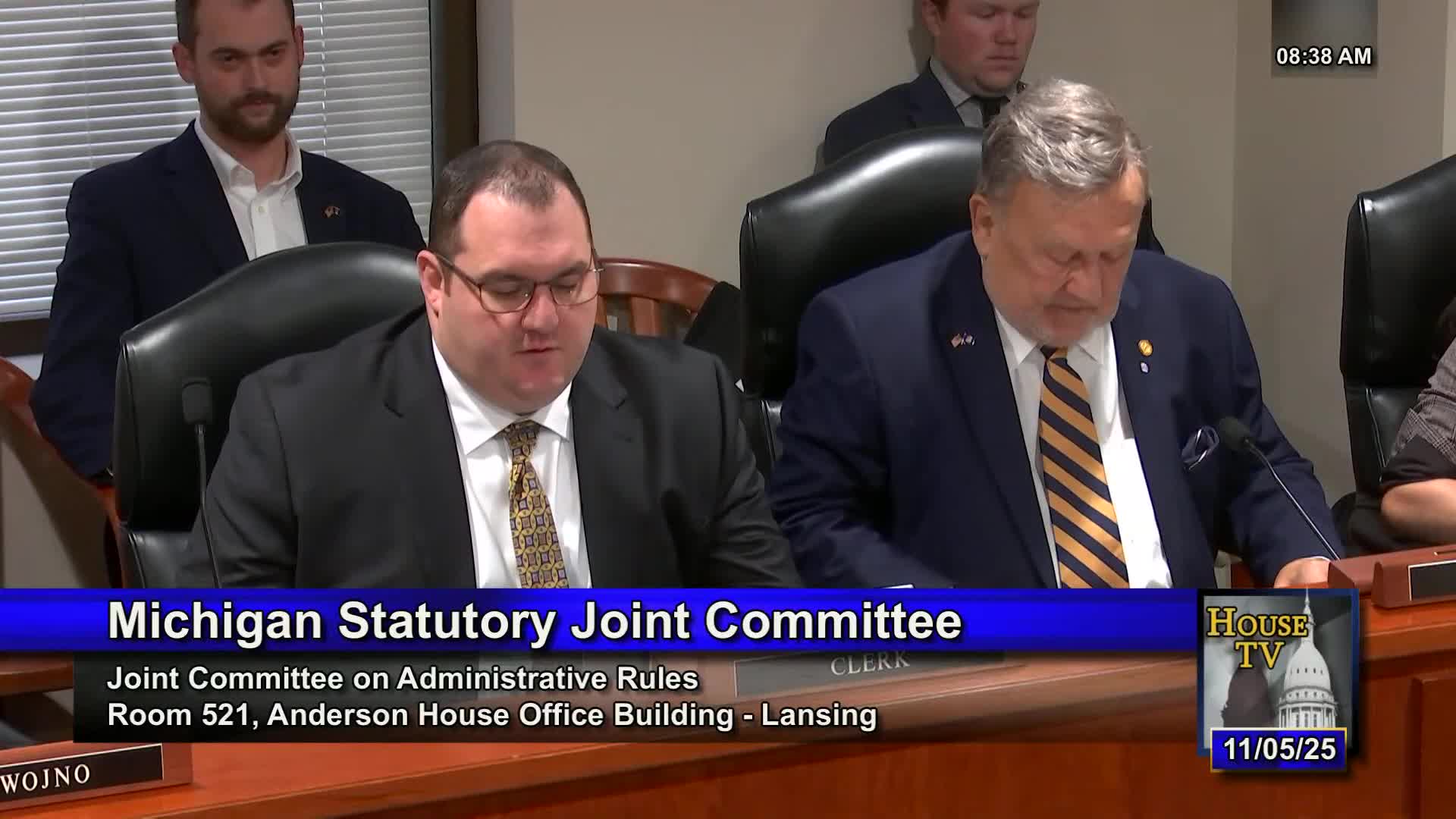Michigan rules panel hears Department of State propose 20‑year voter‑list cleanup and stricter 5‑12 challenge rules
Get AI-powered insights, summaries, and transcripts
Subscribe
Summary
The Joint Committee on Administrative Rules heard Department of State Bureau of Elections officials present a rule package that would clarify list‑maintenance procedures and registration challenges and add a 20‑year failure‑to‑vote trigger to start the federal two‑election‑cycle (four‑year) cancellation process.
The Joint Committee on Administrative Rules heard Department of State Bureau of Elections officials present a rule package that would clarify list‑maintenance procedures and registration challenges and add a 20‑year failure‑to‑vote trigger to start the federal two‑election‑cycle (four‑year) cancellation process.
Adam Fercasse, deputy director of elections for the Michigan Department of State Bureau of Elections, told the committee the rules are intended to harmonize Michigan election law with the National Voter Registration Act and codify the bureau’s existing practices. “We are using that 20 years failure to vote as reliable information that you no longer live at that address, and we’re going to put you on the cancellation countdown,” Fercasse said.
Why it matters: the rule package seeks to resolve longstanding confusion between Michigan’s section 5‑12 challenge process and other legal obligations—particularly the NVRA’s requirement that jurisdictions provide a two‑election‑cycle opportunity to confirm or otherwise preserve a registration before cancellation. Bureau staff said the 20‑year provision is meant as a backstop to capture legacy records carried into the state’s Qualified Voter File (QVF) when it was first implemented.
What the rules would do: the package lays out separate provisions for list maintenance and for registration challenges. It would (1) define the agency’s understanding of “reliable information” and give examples and non‑exhaustive lists of what does and does not qualify; (2) clarify procedures and wording for confirmation and cancellation notices; (3) describe when immediate cancellation is appropriate (for example, confirmed deaths); and (4) set minimum requirements for valid 5‑12 written challenges, including a personal‑knowledge element and notarization for affidavits that seek the shorter 30‑day cancellation timeline under section 5‑12.
Fercasse said the bureau coordinated drafts with the Michigan Association of Municipal Clerks and the Michigan Association of County Clerks and revised the proposal after a public hearing on Sept. 5 that drew 19 speakers and about 1,400 emails. The bureau documented agency changes in its JCAR submission report.
On timing and interaction with federal law: committee members repeatedly asked how the 20‑year trigger would interact with other triggers that already start cancellation timelines—such as undeliverable mail or reported out‑of‑state driver’s licenses. Fercasse said the various triggers are separate but produce the same downstream effect: a cancellation notice that starts the NVRA two‑election‑cycle (four‑year) window for the voter to respond. He described the 20‑year rule as an additional reason to send that initial cancellation notice when no other reliable signals exist.
“We can’t cancel people solely for failure to vote,” Fercasse said, explaining that federal law prohibits cancellation based only on non‑voting; the 20‑year provision is intended to supply a separate, documented basis for starting the routine cancellation notice in legacy cases.
On challenges and personal knowledge: the draft would require that a 5‑12 challenge asserting a shorter 30‑day cancellation timeline include a notarized affidavit stating the challenger’s personal knowledge of the specific facts alleged. Bureau staff said that standard reflects conventional legal requirements for affidavits and limits the situations in which a challenger can trigger the expedited 30‑day timeframe. Officials also explained that third‑party sources such as NCOA/postal data or online databases can be treated as “reliable information” under rule 2 and may start the four‑year cancellation process, but they are not a substitute for a notarized 5‑12 affidavit that would curtail the NVRA period.
On citizenship verification: committee members asked how the bureau uses federal systems to check citizenship. Fercasse said the bureau uses SAVE (Systematic Alien Verification for Entitlements) for individual lookups when appropriate but that there is no universal master citizenship list; SAVE is a tool for verification rather than a bulk suppression list.
Points of contention: members asked for more clarity on several operational details—how clerks should interpret "personal knowledge," whether a clerk’s representative can perform house‑to‑house canvass functions, and when and how mail notices are returned and processed. Several members urged codifying or clarifying the definition of "clerk" and related procedures, and asked for additional follow‑up meetings to resolve technical questions. Two public comment cards read at adjournment recorded opposition but the cardholders did not speak.
Next steps: bureau staff said they would continue to answer committee questions and could return for another hearing; the committee did not vote on the package during the session.
